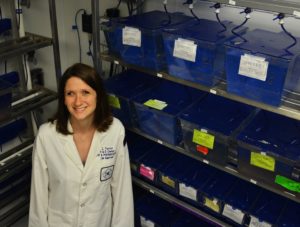Cammi Thornton – Alumna Spotlight
 Principal Research Scientist and Development Chemist, Department of Biomolecular Sciences, UM School of Pharmacy
Principal Research Scientist and Development Chemist, Department of Biomolecular Sciences, UM School of Pharmacy
Hometown: Edwards, MS
BS in Forensic Chemistry (2006)
LinkedIn
When and why did you decide to major in forensic chemistry?
In high school, I loved watching CSI, Law and Order, etc. and I loved reading Patricia Cromwell’s books such as Body Farm, Body of Evidence, etc. When I took anatomy and physiology in high school, I knew I wanted to major in a science field. I started doing research into the various science fields and came across forensic chemistry at Ole Miss and knew that was my major.
Please share some significant accomplishments or favorite memories from your time at UM.
Some of my favorite memories as an undergrad were how close each of the forensic chemistry majors were. It is a fairly small program, so you get to know each other very well over the years. I have kept in touch with many of my fellow graduates over the years. As far as accomplishments go, I came from a very small high school that wasn’t able to prepare me well for this program, and I was able to get my forensic chemistry degree with honors, even though I thought I was going to fail the first semester. I, therefore, want to encourage each student to reach for their goals no matter their background. Don’t be afraid to meet with the professors to get help, and make friends in the classes to go over the class material.
Describe your educational/career path since graduation.
One of the classes I took during undergrad was Forensic Toxicology with Dr. Willett and I loved that class. It was exciting and challenging. At the end of my senior year (2006), I learned that she was hiring for an associate R&D chemist position, and I applied. Upon graduation, I became an associate R&D chemist in her environmental toxicology lab. I have worked in her lab ever since and am now a Principal R&D chemist.
We study how environmental toxicants (benzo[a]pyrene and cannabinoids) cause developmental effects in zebrafish. The effects that we find in the zebrafish can then be translated to humans because zebrafish share about 70% homology with humans. Additionally, we use zebrafish to identify new drugs of interest to reduce seizures in epilepsy models. One of the things I love about my position is that I help mentor forensic chemistry students that join our lab for senior research projects. In this way, I keep up with my forensic chemistry ties.
What is the value of studying forensic chemistry in today’s world?
I don’t believe you can put a value to studying forensic chemistry. Unfortunately, more crimes are being committed every day so there is a definite need to have as many trained forensic personnel as possible to be able to correctly solve each case in a timely manner. Additionally, as in my case, having a degree in forensic chemistry opens many other doors outside of the forensic field because of the many other chemistry and biology courses you take. I thoroughly enjoyed all of the classes that I took and was excited for the crime lab internship opportunity that I had.